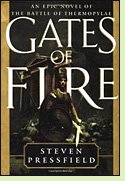Gates of Fire
by Steven Pressfield
Reviewed by David Maclaine

In Gates of Fire, Steven Pressfield takes his readers deep into the psyche of the Spartans, whose fanatical courage and resolve was a key to the ultimate victory of Greece over the invading Persians. The novel centers on a young man named Xeones who has survived the bloody sack of his city and determines that Sparta will be his new home. A succession of stories that flit back and forth in time provide a close and detailed look at the harsh training that produced the most fearsome army of the age. By the time the novel reaches its climax, when the Persians are at hand and the 300 Spartans march off to the pass at Thermopylae, the reader has been drawn deeply into the ancient Spartan theory of training the mind and body for warfare. Then comes the most gripping, blood-spattered recreation imaginable of the famous battle.
If you want to know why and how the Spartans fought and died, Pressfield's version provides an unflinching answer to those questions. Gates of Fire lays bare a key moment in history, the first clear proof that the military system devised by the Greeks and honed to perfection in Sparta was all but invincible when facing the fighting styles that had evolved in the East. But Pressfield illuminates more than the bones and sinews of the Greek way of waging war. He also brilliantly addresses the bigger questions of why men march off to fight for their homes, and how they master their fears in order to stand firm for their comrades in arms. Nor does he forget to probe the nature of an even greater courage, that of the women who send their brothers, husbands and sons to face death on the battlefield. "Go tell the Spartans…" begins the famous short poem of Simonides on the dead of Thermopylae, but Pressfield's mission is to tell the rest of us the lessons we should learn from those deaths. (1998, 386 pages)
More about Gates of Fire at Powell's Books, Amazon.comGates of Fire appears on the list of The 36 Best Historical Novels for a Survey of Ancient Greek History
Other novels about Spartans:
The Wreckage of Agathon by John Gardner (1970), about a seer and his apprentice imprisoned because of their supposed involvement in a rebellion against the Spartan tyrant Lycurgus. See review or more info at Amazon.com
The Fox by M.N.J. Butler (1995), about a Spartan prince during the war between Athens and Sparta. See review or more info at Amazon.com
Spartan by Valerio Massimo Manfredi (1988), about two brothers, one raised in the Spartan warrior tradition, the other in a family of Helot slaves, on the eve of the Persian invasion. More info
Nonfiction about The Battle of Thermopylae:
Thermopylae: The Battle that Changed the World by Paul Cartledge (2006). More info
The Battle of Thermopylae: A Campaign in Context by Rupert Matthews (2008). More info
Thermopylae: The Battle for the West by Ernie Bradford (1993). More info
At the Movies:
300, the gore-soaked, digitally enhanced 2007 movie about the Battle of Thermopylae, directed by Zack Snyder.
Online:
Greco-Persian Wars: Battle of Thermopylae, an article by David Frye at History.net
Back to Novels of Ancient History
Back to Directory of Book Reviews